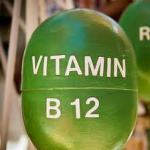 Many of the patients who come to see me will complain of feeling fatigued. Whilst their symptoms may vary, many of their complaints are similar, such as a lack of focus and concentration. Some may complain of stomach upset, bloating or constipation, whilst others may feel moody and find that their memory is starting to slip! These symptoms combined with low energy are a warning sign. These people may be deficient in a single nutrient, one that is vital for each cell in the body, B12.
Many of the patients who come to see me will complain of feeling fatigued. Whilst their symptoms may vary, many of their complaints are similar, such as a lack of focus and concentration. Some may complain of stomach upset, bloating or constipation, whilst others may feel moody and find that their memory is starting to slip! These symptoms combined with low energy are a warning sign. These people may be deficient in a single nutrient, one that is vital for each cell in the body, B12.
B12 is required in your body for:
• Regulating healthy metabolism and energy production.
• Synthesis of DNA and RNA
• Helps to regulate mood in the brain
• Supports normal nerve function
• Proper formation of red blood cells
and the deficiency is more common than we realise.
When researchers looked at 3,000 men and women in the Framingham Offspring study they discovered something important. 39 percent of them had B12 levels at or below the “low normal” range. That’s about two out of every five people. And whilst being at the low end of normal may sound okay, it turns out people in this range may be at risk for neurological symptoms of B12 deficiency.
Those who lack this essential nutrient may experience weakness, fatigue, poor memory, confusion and nerve problems. Other indications include problems with balance, constipation, loss of appetite and soreness of the tongue or mouth.
You will find B12 in organ meats, lamb, beef, cheese and eggs, and also in seafood such as mussels, clams, sardines and salmon.
So, why, if you are not a vegetarian, are your levels low?
Well, B12 is bound to protein in food but your body cannot use it in that form so your stomach has to produce hydrochloric acid in order to separate the B12 from the protein. Once it is released it is free to combine with enzymes and another protein secreted by the stomach, called ‘intrinsic factor’. Then it is absorbed by the small intestine for distribution around the body.
If your stomach is not producing enough hydrochloric acid the B12 cannot be separated from the protein it is bound with. It can therefore never combine with intrinsic factor and can never be absorbed into the small intestine for delivery to all your cells.
As we get older we lose the ability to produce enough stomach acid, and if you are taking anti-acids it destroys the stomach acid and therefore the ability to absorb B12 from your food, so the best thing is to take a supplement where the B12 is not bound to a protein and is therefore not reliant on hydrochloric acid to separate it.
